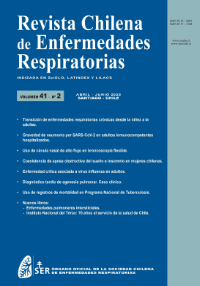Severity assessment in immunocompetent adult patients hospitalized for community-acquired pneumonía associated to SARS-CoV-2 coronavirus
##plugins.themes.bootstrap3.article.main##
Abstract
The severity assessment in adult patients with community-acquired pneumonia (CAP) allows us to decide the place of management, guiding the diagnostic study and planning treatment. Objectives: To examine the performance of seventeen severity predictor indices (CRB65, CURB, CURB65, CORB, CARSI, SOAR, A-DROP, PSI, SCAP, SMART-COP, REA-ICU, ATS/IDSA minor criteria, qSOFA, CALL, COVID-GRAM, 4 C and STSS) in adult patients hospitalized for CAP associated to SARS-CoV-2 coro- navirus. Methods: Prospective clinical study conducted between April 1,2020 and December 31,2021 in adult patients hospitalized for pneumonia associated with COVID-19 in the UC Christus Health Network. The adverse events examined were admission to the critical care unit (MICU/ICU), use of mechanical ventilation (MV), prolonged length of stay, and in-hospital mortality. The predictor rules were compared based on their sensitivity, specificity, predictive values and areas under the receiver ope- rator curve (AUC). Results: 1,251 adult patients hospitalized for CAP associated with COVID-19 were evaluated, age: 59 ± 17 years, 55% male, 79% had comorbidities, hospital length of stay: 15.3 ± 19.2 days, 18.3% were managed in the ICU, 18.1% required mechanical ventilation and 11.8% died in the hospital. Adverse events were more frequent and hospital stay was longer in the high-risk categories of the different prognostic indices. The CURB-65, CARSI, A-DROP, PSI, COVID GRAM, 4 C and STSS were able topredict the risk of death quite accurately (AUC > 0.80). The CURB, CORB, SCAP, SMART-COP, ATS/IDSA minor criteria and COVID-GRAM allowed predicting the risk of admission to the critical care unit and connection to mechanical ventilation with moderate precision (AUC > 0.70). The performance ofprognostic indices decreased significantly in predicting prolonged hospital length of stay. Conclusion: Severity assessment indices allowed predicting adverse events with different precision in adults hospitalized for community-acquired pneumonia associated with COVID-19.
##plugins.themes.bootstrap3.article.details##
Pneumonia, COVID-19, Organ Dysfunction Scores, prognosis, hospital mortality, Critical care

This work is licensed under a Creative Commons Attribution-NonCommercial 4.0 International License.







